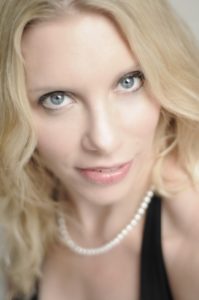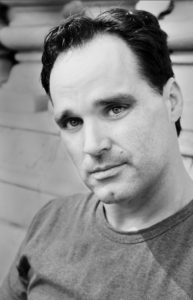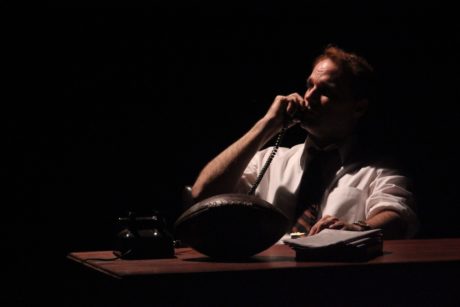
When Ginger Dayle founded New City Stage Company in the summer of 2006, she was a graduate student at Villanova University, hoping to provide herself and other young theater artists with professional experience in acting, directing, and design. Her partner Russ Widdall, an award-winning actor who has appeared in many of the company’s productions, came on board as Artistic Director in 2009, expanding the work to include more established artists, Equity contracts, and notable playwrights.
Over the past year, the company has re-evaluated its mission, with the intent to cultivate “emerging playwrights and resident artists in the development of new and lesser-known works” through staged readings of submitted and solicited materials, and by offering educational experiences and showcase performances to aspiring young talents. Another of the company’s fundamental goals is to educate patrons “about politics, American history, and current events.”
The new mission statement has been adopted for NCSC’s upcoming production of Roseburg, an original work by Dayle and company that will have its world premiere in July. During a rehearsal, I had the opportunity to see some of the work-in-progress, and to talk to Ginger about her new direction and her new show.
Deb: What inspired your new mission at New City Stage Company, and how are you implementing it?
Ginger: We decided that there are too many companies producing old standards, and not enough focus on new work. While several other companies offer new plays, they don’t often support a new work through the entire process, from the playwright’s initial conception to the theater’s full-stage production. We wanted to be like an alpha-omega incubator from start to finish, providing support for every step in the development.
We began with Hinckley, which I wrote and produced at New City Stage, and then we presented a new play reading series last summer, working with the playwrights, with the idea to produce one or more of them in an upcoming season. With Roseburg, I conceived and continue to write it, while workshopping it with our “Voices for a New City” ensemble over a four-week period. I wanted the participation of the young cast and team, almost as a chorus, to get their opinions and input, so that we could all have ownership of it.
Why do you feel a responsibility to education?
Because of the way I got into theater, in an oversaturated market; it was very difficult, after having been a dancer for many years. I didn’t have a connection to help me find a way in, and I essentially had to found my own company to be able to work. So we want to provide a way in for young theater artists who might not have one. I also don’t think it’s fair to use interns without paying them. Our program “Voices for a New City” gives them the opportunity to work in a more professional situation, and to be compensated for what they do. The ensemble we’re now working with for Roseburg is all students, most of them from Temple University. It’s interesting and valuable to see people at the start of their careers, to follow their development, and to see what they achieve in the future.
Many of the recent shows at New City Stage Company have been politically themed. What stimulated your interest in those subjects, and what is their relevance at this time?
I’ve always had a very strong opinion about gun control, which is the main theme of Roseburg, with Robert Kennedy’s speech advocating for gun laws on the steps of the Douglas County Courthouse in Roseburg, Oregon in 1968, his assassination less than two weeks later, and the 2015 mass classroom shooting at Umpqua Community College in the same town of Roseburg. Our best-selling show to date at New City Stage Company was RFK, which we first presented in our 2012-13 season, remounted in our 2013-14 season—which included Frost/Nixon and the world-premiere of my first play Hinckley–and also was brought to the Capital Fringe in Washington, DC. Because of its success, we realized that we had found our niche. We followed it with a “Presidential Satire Reading Series” in May 2014, and since then we’ve been working on Roseburg.
An important impetus for RFK was our founding Board President and greatest supporter Russell W. Yurchak, Jr., who passed away in January. His admiration for, relationship with, and first-hand accounts of the JFK Presidential campaign and the Kennedy White House, along with his insights into the Office of the Attorney General, fueled our desire to re-tell the stories of the Kennedy dynasty. He even provided some of the vintage photos of RFK that were on display during our productions, which he funded.
I think that such issue-driven theater is always relevant, but it needs to be timely—the hot-button issues and current events that people are talking about, like gun control. It would be irresponsible NOT to address them; it’s important to generate more talk about them.
Tell us about your artistic process for Roseburg, and how you came to write a play about the events that transpired there.

I wanted to bring Robert Kennedy back, with Russ portraying him again, but I wasn’t sure how. I knew I wanted it to run during the Democratic National Convention. Then in October there was the shooting in Roseburg, and newscasters brought up the speech by Robert Kennedy during the Vietnam era. So I knew how timely and important it was, and I knew that THIS was the play we should be doing.
I did a lot of reading, including the books by Thurston Clarke and Jules Witcover on RFK, and Dave Cullen’s Columbine, on the high-school massacre. I even emailed the author and he sent me more information. After all my research, I find that I’ve changed my opinion about gun violence; I now see it from more of a psychological perspective, of how mental health issues are inextricably tied in with it.
The format of the show is a series of scenes mixed with monologues that go back and forth in time. There are testimonials to RFK by people who knew him, or had memories of him and his shooting. Some are taken verbatim from historical sources, and some are imagined, but based on my research. So it’s mostly factual, then dramatized. The characters talk about the assassination as if they were witnesses, and they all have strong ideas. It’s not really bi-partisan, but there are multiple perspectives and diverse opinions, and there are period videos integrated into the live performance.
It’s obvious that you have a deep respect for RFK. What is it about him that you so admire?

When he believed in something, he talked about it, even if it wasn’t popular at the time. He started a dialogue with his campaign, not so much to win, but to raise issues. He felt very strongly about gun control, having lost his brother to an assassin’s bullets. I’ve also lost friends to gun violence, so that’s something that we have in common. Very few politicians these days have that personal a connection to the issue. And too many modulate what they say, they’re afraid to be themselves. RFK was real, he said what he felt.
Is it more difficult to portray a real-life character than a fictional one?
There’s definitely more responsibility in getting it right. The trickiest one in this show is the shooter. He took his own life during the stand-off with the police, and never shared a lot of what he was thinking before the shooting. It’s likely that a deep psychosis came from a profound sense of loneliness and isolation. So many times in situations like this, we don’t find out until it’s too late. Dylan Klebold’s mother wrote a book looking back on where she went wrong and how she failed to recognize the seriousness of his problems. Most of the time mass murder comes from mental health issues, and the issue is exacerbated by the lack of restrictions on who can get the guns; access is a real problem.
What are your plans for Roseburg after its world premiere in Philadelphia?
A couple of festivals are interested, but it’s still a work-in-progress, so it won’t tour immediately. I just found out that the Roseburg shooter’s mother was a huge Donald Trump fan, she used to read to him from The Art of the Deal. So with new information like this, I’m still adding, editing, and refining the script.
What do you hope audiences will take away from the show?
It’s a collection of ideas, so it’s most important to me to get them thinking about gun violence and gun control. I even took the ensemble to a shooting range in preparation for the show, so that they could have the first-hand experience and gauge their personal reactions, which they could then incorporate into their performances. If someone in the audience hates the play, but thinks beyond what they just saw on stage, I’ll consider it successful.
What’s next on the horizon for New City Stage Company?
We’ve been working on the development of a couple of new plays. I’m writing one on the Kennedy/Nixon debate, and we would also like to produce Fred Valenti’s The Living and the Dead: The Trial of Robert McNamara, which we presented as a staged reading in June 2015. We’re planning our “Ripples of Hope Festival” for the summer of 2017, which will feature plays dealing with any of the issues that Robert Kennedy discussed. And we want to continue our mission of giving opportunities to others, providing support so that they don’t have the burdens of self-production and self-promotion, and can focus all of their attention on the art. Also, because The Adrienne, which has been our home base for years, is now becoming a comedy center, we will be searching for a new venue when that is no longer available to us. So we’ll be busy!
Do you have any other upcoming work or projects apart from New City Stage?
Russ just finished an indie film called Wetlands. I’m a Drama Desk Awards voter in New York, so that takes up some of my time outside of Philly. And I’ve been learning a lot by associate producing in New York and as a producer at the Eugene O’Neill Theater. I find it interesting and rewarding, and I like to mix it up so I don’t get bored!
Thanks, Ginger, for giving us this in-depth preview of Roseburg and the future of New City Stage Company!

Roseburg plays July 7-31, 2016, at New City Stage Company, performing at the Second Stage at the Adrienne– 2030 Sansom Street, 2nd floor, in Philadelphia, PA. For tickets, call the box office at (215) 563-7500, or purchase them online.
LINK:
RFK reviewed by John Stoltenberg at The Capital Fringe on DCMetroTheaterArts.




